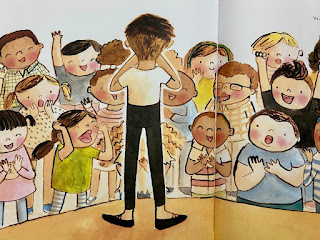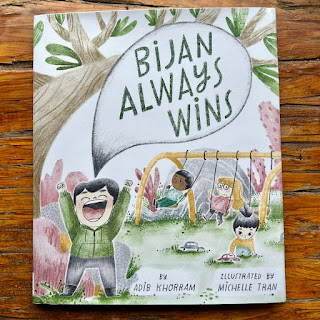By Mac Barnett
Illustrated by Kate Berube
(Candlewick Press, 2022)
I checked this book out of my local library based on the writer’s name and the cover image. Mac Barnett is a clever, sparkly writer of children’s books like Sam and Dave Dig a Hole and Count the Monkeys. I figured I could use some amusement. But this isn’t that kind of book. (More on the cover in a bit.)
The book focuses on a regular feature of a school’s Friday morning assemblies. At the end, one student performs a special talent, such as playing the tuba, performing magic tricks or doing stand-up. This Friday, as the title notes, it’s John’s turn.
At breakfast in the school cafeteria, John doesn’t look so good. The students around him eat, chat and laugh. John does none of that. He’s got a case of the nerves. Later, backstage, he changes into a white leotard, black pants and slippers. He sits, anticipating his performance, still looking nervous as the assembly proceeds through its normal agenda items:
Mr. Ross reminded us permission slips
were due Monday. We all sang a song.
At last, it’s time for John.
“What’s John gonna do?”
Andre asked without raising his hand.
Mr. Ross looked at his paper.
“He’s doing a dance.”
“Cool,” Andre said.
He never raises his hand.
There’s always an Andre. And the fact there is, makes the reader worry a little for John. This is unlikely to be Andre’s (and others’) version of a cool dance.
John dances. Neither John’s movements nor the music—“strings, violins and things”—is familiar. Kids laugh.
But they stop when shushed. John commits and, yes, he shines. He takes a bow. How will his peers respond? The ending, of course, is how we want things to go for every young John, daring to be different, sharing his true passion.
Bravo!
I do have a quibble over the cover. I admit the image of a young boy in ballet gear, complete with pointe shoes, drew me in. I knew this kid book would be different. I figured it would confront stereotypes and traditional gender roles. As an adult, I saw the cover’s message: Very Special Book. But, for kids, the cover may make them giggle—boys, especially—and steer clear of picking it up. I would have preferred an image of John’s face nervously peeking through a stage curtain at the expectant audience. Indeed, there’s a suggestion of this in part of the title page. Given that the book avoids mentioning John’s talent right away, the cover is also a spoiler, making the reveal less dramatic.
On my second time paging through the book, I focused on Kate Berube’s illustrations, done with ink and paint on cold-pressed watercolor paper. She skillfully depicts each scene. The title page shows students gathering in the open assembly room (aka the cafeteria), some finishing up breakfast, some chatting, some seated facing the stage, ready for what’s to come, one intently reading a book in his lap.
Whenever Mr. Ross talks, there’s at least one audience member talking to a neighbor. By contrast, when a student performs, the students give them full attention.
And then comes John’s turn. Classical music plays and the students look bored, skeptical; one looks primed to heckle. John looks like he’d rather be anywhere else, his face full of angst. His face is tentative during his first moves.
And then…
In a double-page spread, Berube depicts six stages of one grand leap and we see John’s face change from worried and cautious to proud and accomplished. From that point on, there is no turning back. John is in his element.
This is a well-told story and a highly useful book to share with children before talent shows or any school assembly when students or a theater/dance group performs. It’s also a great conversation starter about following one’s interests no matter what the peanut gallery might say or do. Pot-shots are easy. Sometimes they come when someone feels uneasy, the subject matter unfamiliar. Sometimes they arise from a desire to mock. There will always be critics.
Let John and boys like John dance on.







